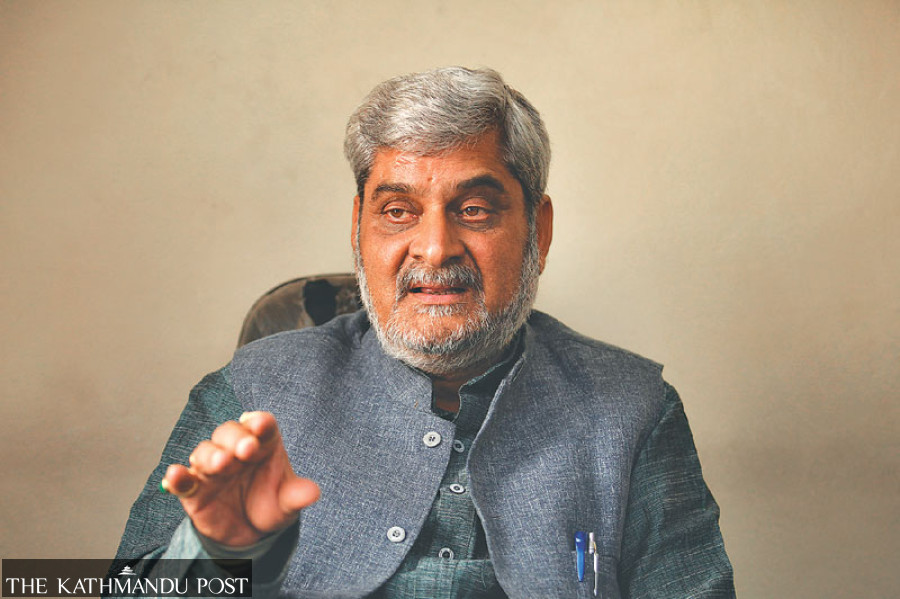Politics
Efforts underway to bring Madhesh-based parties under one umbrella
Hridayesh Tripathi starts talks with Madheshi leaders, aiming to start with a loose alliance.
Post Report
Cross-party efforts are underway to bring fragmented Madhesh-based political parties under a single umbrella.
This time, Hridayesh Tripathi, chairman of the Janata Pragatisheel Party, has been meeting and holding talks with Madhesh-based leaders and urging them to come under one umbrella so that they can form a “loose alliance” at least for now.
“I have been making this effort for over six months. Now I have started meeting top leaders of the Madhesh-based political parties,” Tripathi told the Post. His team has urged the leaders to create a “loose alliance” at first and to transform it later into a united front for the “larger cause of the Madhesh and the Madheshi people”.
Tripathi has formed a three-member task force to hold talks with leaders from various Madhesh-based political parties and he himself is holding talks with the top brass.
“Most of those who I or our friends have spoken to are positive towards forming such an alliance at the beginning,” Tripathi said. “As the country is confronting several problems and crises, the time has come for us to unite and work together.”
After the second people’s movement in 2006, politics in Madhesh got a new lease of life with the rise of regional political forces. New political parties and fronts were formed, raising several issues related to the Madheshi people and their under-representation in state organs.
Some of the prominent Madhesh-based parties got unified and emerged as decisive forces in national politics. But they could not sustain their unity.
Within a couple of years, the Madhesh-based parties split into several parties. They, however, remained united on their agendas until the promulgation of the new constitution in 2015.
Stating that the major political parties didn’t address some of their important demands while writing the new constitution, they led a strong agitation dubbed Madhesh uprising, and they even protested on the Nepal-India border blocking the movement of goods from India.
Dozens of people were killed during the uprising but their agendas remained unsettled and the country went into the local, provincial and federal elections.
The Madhesh-based political parties from the southern belt of the country with a huge vote share in the national politics could not retain power due to divisions among them.
Tripathi hopes that they will now “learn from the past and aim to revive the old glory of Madheshi parties and address the country’s crises”. Tripathi hopes this mission can bring them together and will make them agree on some crucial issues.
So far, he has met Upendra Yadav, chairman of the Janata Samajbadi Party-Nepal (JSP-Nepal); CK Raut, chairman of the Janamat Party; Ashok Rai, chairman of Janata Samajbadi Party; Resham Chaudhary, chairman of the Nagarik Unmukti Party; and Prabhu Sah, chair of Aam Janata Party. Some of the task force members have met with Mahantha Thakur, too. Tripathi also plans to meet Rajendra Mahato, who recently formed a new party, Rastriya Mukti Kranti Nepal.
“I have found that no one is against this proposal,” Tripathi said. “Once forming the loose alliance, we will agree on some common agendas and will collaborate on those in the future. But that does not mean that we will come together to form a new party immediately.”
After talking with all top leaders of the Madhesh-based parties, the Tripathi-led team now plans to hold a joint meeting with them. The meeting will discuss the possible agenda and the issues in which they can work together.
This initiative, however, hasn’t made everyone optimistic.
“Madheshi parties are divided horizontally and vertically and have split into so many parties, groups and factions,” a senior leader of a Madhesh-based party told the Post. “There are very few chances that they will come together.”
Though Tripathi has started a new campaign, some experts and observers doubt all Madhesh based parties will come together.
“The ground in Madhesh is not the same as it was ten years ago,” said Dipendra Jha, a longtime observer of Madheshi politics and former chief attorney of Madhesh Province. “The situation is unpredictable as new youths are emerging and the ground is fast shifting.”
Unlike Yadav’s JSP-Nepal, no party holds a stronghold in the Madhesh, said Jha.
Another Madheshi leader, however, said that small parties led by Tripathi, Raut, Chaudhary, Sah and the Rastriya Mukti Kranti Nepal are likely to come together, if not those led by Upendra Yadav and Mahatha Thakur.
Tripathi plans to hold a joint meeting of chiefs of all the big and small Madhesh-based parties within a week.
A leader said the initiative will at least bring them together and engage them in some brainstorming.
The senior leader pointed out a slew of reasons why unity among Madhesh-based parties is easier said than done.
“Due to a lack of common ideology and principles, tendency of not accepting each other’s existence, personality clashes, vendettas, local dynamics and possible power-sharing deals, the parties might find it hard to come together,” the leader said.




 9.12°C Kathmandu
9.12°C Kathmandu














